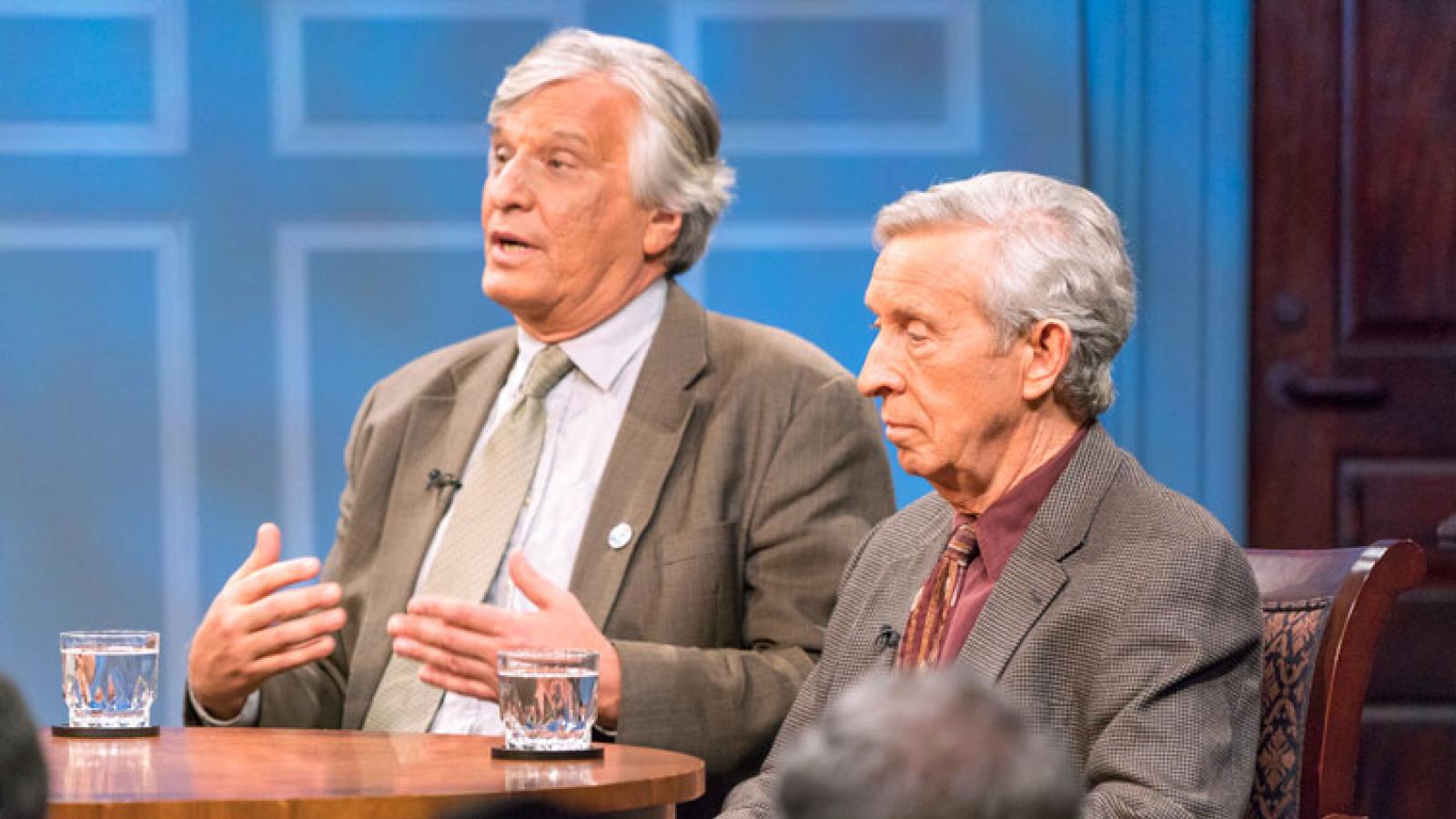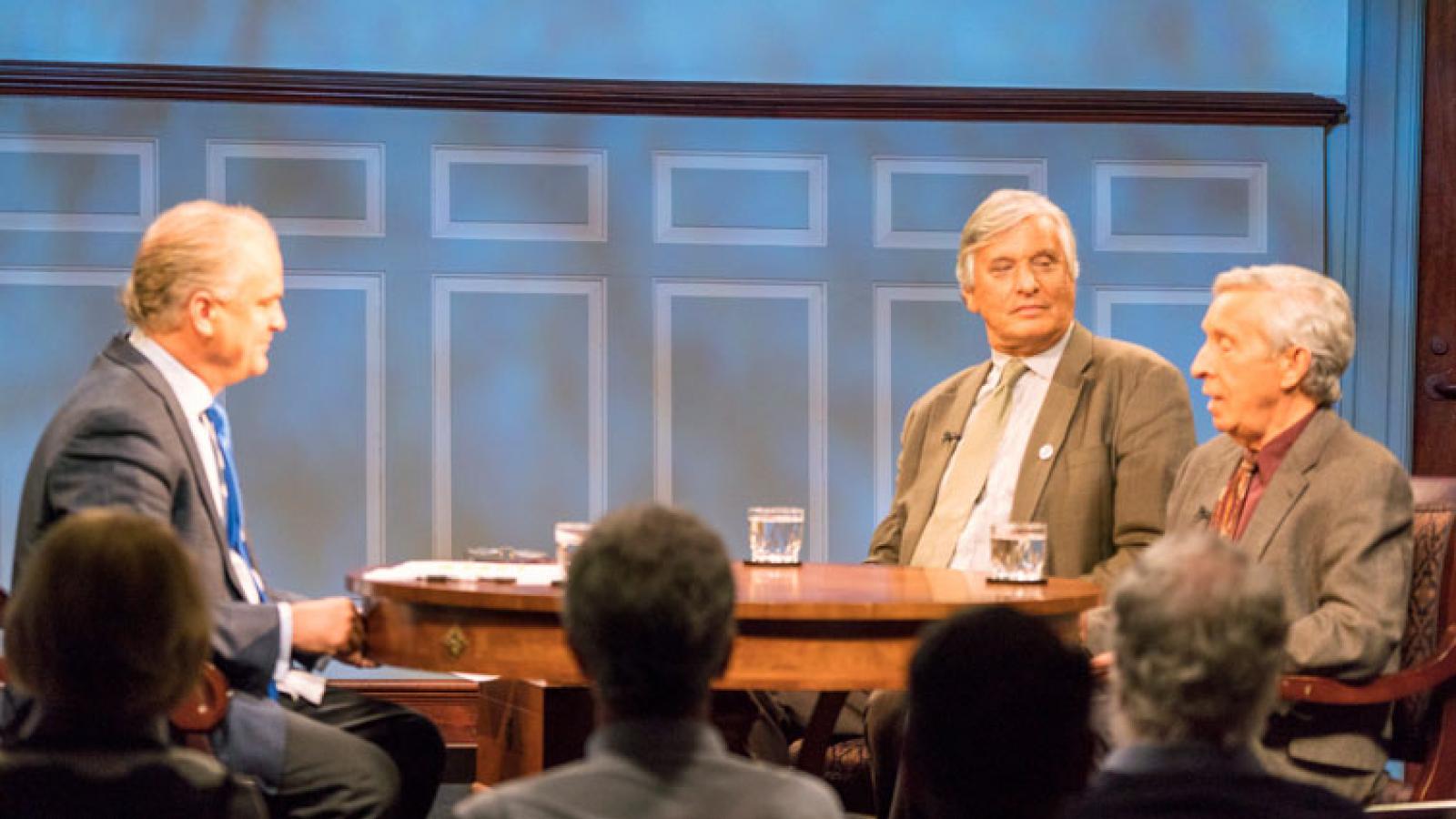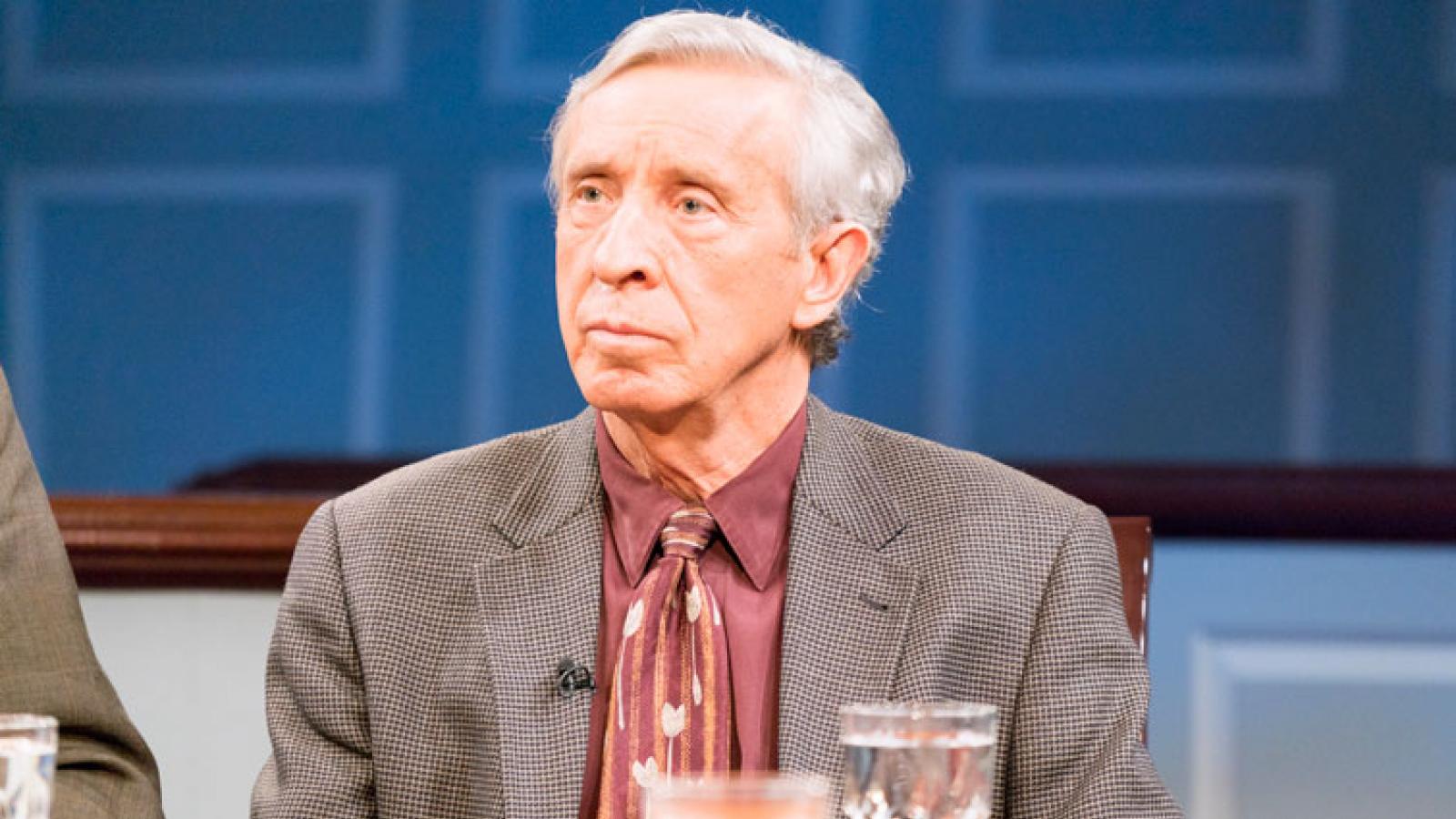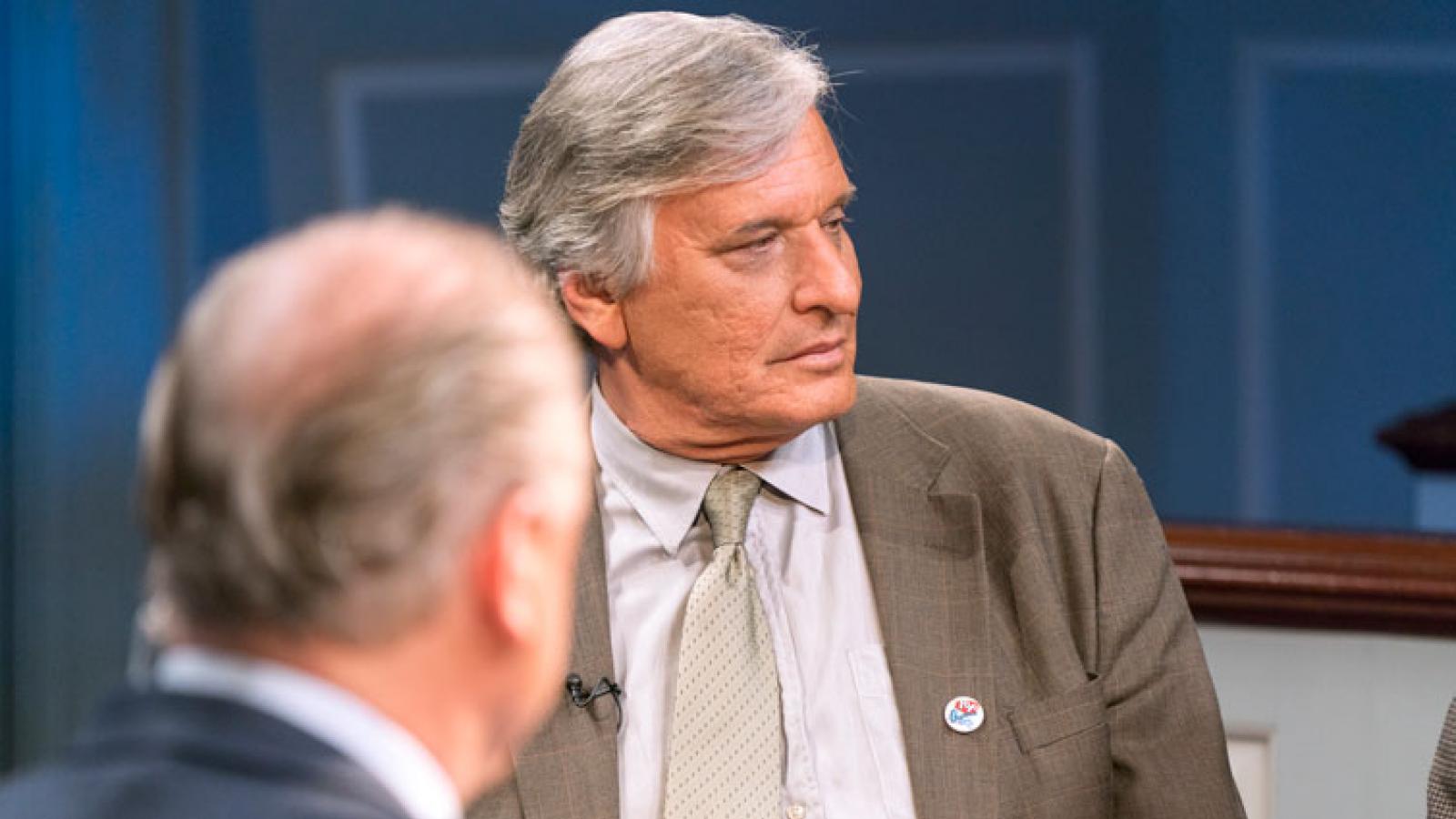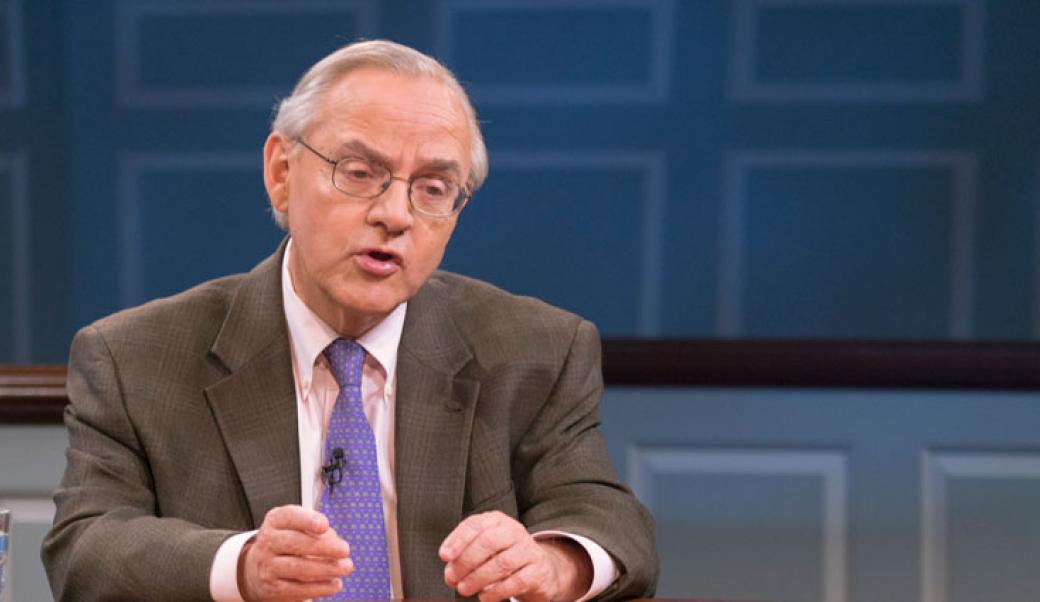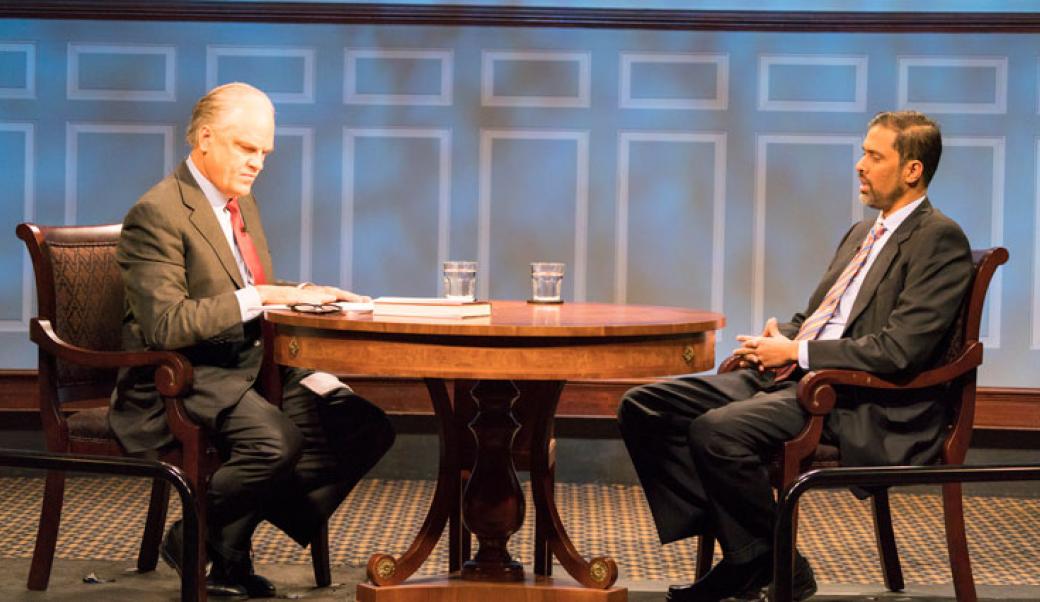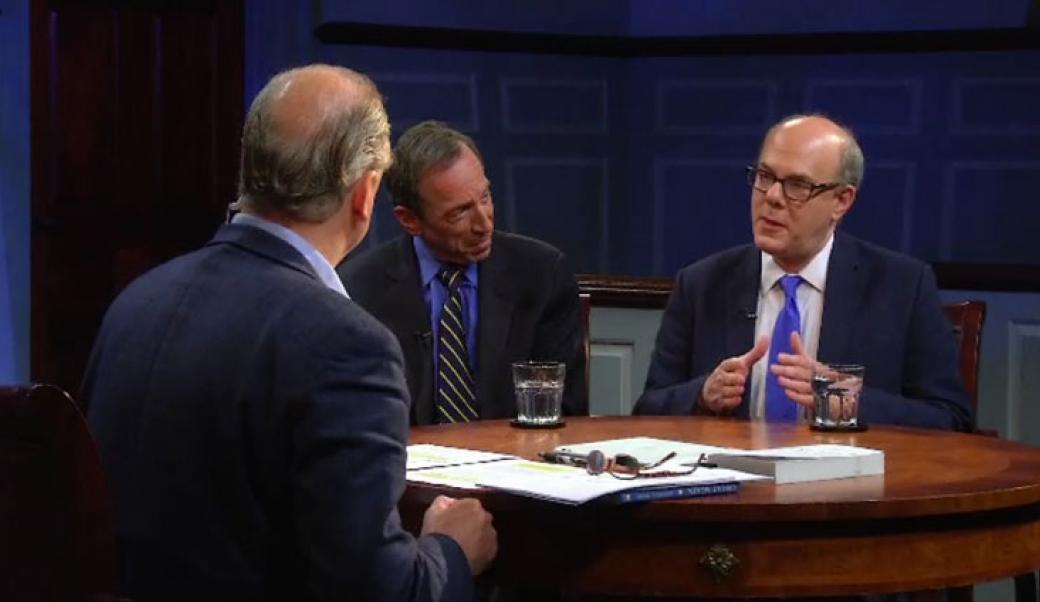About this episode
February 05, 2017
Brian Balogh and Gary Gallagher
The current political environment is rife with division and frustration across the political spectrum, and a there’s a sense among some that things may be spinning out of control. But are things really that dire? President Abraham Lincoln took office as the country began a terrible civil war. Franklin Delano Roosevelt inherited the greatest economic collapse in our history. Is there anything these and other moments can teach us about today’s America and the critical first months of Donald Trump’s presidency? As a part of the Miller Center's innovative First Year Project, American Forum continues its special series of programs. In this episode we ask if Donald Trump will reunite our divided country. How do great presidents navigate troubled times? Two historians weigh in: Professor Gary Gallagher, a renowned scholar of the Civil War at the University of Virginia, and Brian Balogh, a historian of the role of government in the development of a modern America and a host of public radio’s “BackStory.”
The First Year
First Year 2017: What difficult first years can teach President Trump
Transcript
0:51 Douglas Blackmon: Welcome back to American Forum, I’m Doug Blackmon. The current political environment in the U.S. often feels as if things simply couldn’t be any worse. There is so much division and frustration, all across the political spectrum; a controversial election, deep divisions within both the Republican and Democratic parties, and a sense that things are simply spinning out of control. But are things really that dire? President Abraham Lincoln took office as the country began a terrible civil war. Franklin Delano Roosevelt inherited the greatest economic collapse in our history. Is there anything from those and other moments in our past, that could help us understand America today, and what may happen over the next few critical months of President Donald Trump’s first year in office. In this episode, we’re continuing American Forum’s special series called, “The First Year Project.” It grows from more than a year of work by scholars here at the Miller Center and around the country, to identify the most crucial issues facing the next president, gathering experts to study them, and developing practical advice for moving the country forward. So the big question in this episode is can Donald Trump reunite our divided country.
FACTOID: The Question: Can Donald Trump Reunite Our Divided Country?
How do great presidents navigate troubled times? Historians usually hate being asked to draw parallels between the present and the past, but today, we have two eminent American historians; Professor Gary Gallagher, a renowned scholar of the Civil War here at the University of Virginia, and Brian Balogh, an historian of the role of government in the development of a modern America, and also a host of the NPR radio show, “BackStory.” Thank you both for joining us.
Brian Balogh: Good to be here.
Gary Gallagher: Good to be here.
2:30 Blackmon: Historians hate to be asked to draw parallels between present times and past times, and often particularly hate to be asked for “lessons” from the past, as many historians do. If you were trying to identify some moment that most reminds you of what’s happening in the country today, the context of the beginning of this next presidency, where would you go with that? Brian.
Balogh: I would go all the way back to Andrew Jackson actually, and I would talk about two president elects that are simply deep and intense outsiders. I’d talk about two alpha males, very aggressive, I’d talk about two men who feel, in their gut, they know what is right, and who are not necessarily guided by the Constitution or by rules and regulations. Andrew Jackson, and Gary can correct me on this, Andrew Jackson felt strongly that he was abiding by natural law, but natural law always seemed to support whatever he wanted to do.
FACTOID: Jackson won 41.4% of popular vote in 1824 and 56% in 1828
Gallagher: Andrew Jackson scared a lot of people, he scared a lot of the old elites, because he seemed to be breaking with what many people considered long settled ways in which to pass power and to act once you were in power, he was seen as both bringing in the very rough side of society, which scared a lot of the elites, but also someone who wasn’t going to be bound by rules. That combination was very volatile for many people.
FACTOID: Jacksonian democracy promoted common man and states’ rights
4:00 Blackmon: And also, this notion that this expanded electorate in that period, and that Jackson is really going after, are people who are like him to some degree; are really suspicious of institutions and suspicious of the elites who have been governing the country.
Gallagher: Yes, there’s a little bit of irony here though, because Jackson, of course, is part of the elite. He’s a substantial slaveholder, born in South Carolina, but his plantation holdings were in Tennessee. He was a very—he was a man of great substance in that regard, but he had a history of doing things that broke all rules in many ways, including an incursion into Florida when he was a general, and he precipitated an international incident, and he just did whatever he thought was right, as Brian said earlier, and then but because he thought it was right. That justified it, that was the—the justification was that it was his idea to do it.
5:06 Blackmon: But in the end, he’s also a very historic figure.
Balogh: He’s certainly listed among the great presidents. I think if you’re a Native American, you might not agree with that. There are many people who object to that.
Gallagher: He couldn’t be more un-PC, I mean he is just, he…
Balogh: And that’s another similarity.
Gallagher: Check the boxes, check the boxes, yes, for us. But within the context of his time, he was a powerfully attractive person to a very large part of the American populous.
Balogh: And here’s one of the great ironies; he’s best known for standing up for national authority, standing up to the tariff, right? And protecting the authority of the national government. There is this strange connection between representing the masses and leaning towards a more authoritarian bent. We tend to think of those two as opposites, but I think that connection, the populous being represented by a strong leader, is something else that connects Jackson and the president-elect.
6:12 Blackmon: Gary, you wrote an essay for the first year project, about the worst first year of a presidency, that being Abraham Lincoln’s, which obviously, to become president at the moment that the nation is beginning a civil war, you can’t imagine a worse start to a presidency than that. But we’ll come back to that. But I want to ask you about Washington, because I think it is interesting to look. We don’t think of him, at least in the most superficial way, as a crisis president; we think of him as a heroic president, the first, most heroic one. But in reality, he becomes president at a time that the rules haven’t been written yet. We’ve got a Constitution, but we don’t really understand what the power of the presidency is, we don’t really understand how the Judiciary and the Congress and the president interact with one another, and a thousand other things. We just don’t know how this government is going to work and we don’t yet have forged, coming out of the separate colonies period, even though we fought this war together, we don’t really yet have a national identity clearly forged, or a national agreement around these principles of governance. And so, part of Washington’s great achievement is to forge that, or at least begin forging that.
Gallagher: It is and he’s the only person who could have done that, which I think everyone in Philadelphia understood on some level. It’s fascinating, the degree to which this group of really quite remarkably talented individuals, it makes us weep to look around now and then imagine who was in Philadelphia, when there were only three million of us, I mean really weep, but I won’t weep now. Even that group knew that Washington was in a class of exactly one, in terms of the influence, the potential impact, the degree to which he could do things that no one else could do. He understood that very well to, he had an ego, and so that positioned him to carry out a first presidency, in a way that I think no one else could have, and everything he did, as you said, set a precedent.
8:01 Blackmon: Let’s fast-forward to Abraham Lincoln, let’s fast-forward to this worst year that a president could possibly have. Is there a moment that’s not Lincoln’s first year, but in the lead-up to these terrible events, when things went off the rails and maybe might not have?
Gallagher: Well, something that we’ve talked about, a lack of faith or a loss of faith in institutions certainly was taking place in the 1850s, and it related to Congress, it related to churches. That’s when national churches broke up, in the ’40s and ’50s, because they couldn’t finesse the question of slavery. The Methodists broke up, the Baptists broke up, there was a loss of faith in the Supreme Court by many people after Dredd Scott in 1857.
FACTOID: Dred Scott Decision allowed movement of slaves into west
So you have the phenomenon in the lead-up to the war, of a pulling away from a kind of shared faith in some institutions, and you have the second party system disintegrating in the 1850s. The Whigs collapsed as the national party and then in 1860, as they try to nominate a candidate for the presidency, the Democratic Party breaks apart and ends up nominating two people.
FACTOID: Dems in north chose Douglas; southerners chose Breckenridge
So there are—I mean, the parties both seem to be in turmoil in our recent run-up to this election, not to the degree they were in the late 1850s and in 1860, but there are certainly some things that resonate between that period and this period, but there’s nothing remotely comparable, as Donald Trump comes into office, to the fact that seven states had left the United States when Lincoln gave his first inaugural address. There wasn’t a war yet but seven states were gone.
9:40 Blackmon: Now, Lincoln also, particularly at the beginning of this period, he’s willing to make big compromises around important things like slavery, with this end of preserving the union.
Gallagher: There’s a very good book that came out this past year on the first Thirteenth Amendment, which was an amendment that would have protected slavery forever, below a certain line, that was ratified by six states before the war really got going. So yes, there were all kinds of compromises going on, particularly relating to emancipation and slavery, because the overarching goal was union, it was not emancipation, that’s something that came because of the war, and so yes.
FACTOID: Historian Daniel W. Crofts wrote Lincoln and the Politics of Slavery
Blackmon: And I think that gets to another thing of that. When we have these tense moments in history and then we get through them somehow, and then later, we’re trying to figure out, well how did that happen. You look at the beginning of the twentieth century, where there’s great social turmoil, Woodrow Wilson is president. But that’s also a time when we see the first virulent anti-immigrant sentiments that are sort of modern in a way that looks similar to the way that we have anti-immigrant sentiment at times today. We see African Americans diminished in their position in American society that period, you get to the Great Depression. FDR makes compromises with southern Democrats to get the New Deal through, that are very bad for some people, particularly African Americans. Then you have, in Lincoln’s time, a willingness, that if it’s necessary, to trade off freedom for these folks, whatever his personal views may have been, that he’s willing to make that trade too, for the preservation of the union. And it seems to me that all of that, in different ways, does speak to one of the danger of, that when the country is stressed and worried and anxious, that sort of bad tradeoffs, or what look like bad tradeoffs later, are one of the things that crop up in these kinds of situations. What do you make of that, Brian?
Balogh: Well, I think that any effective president has to put together a governing coalition; this is often done within political parties. So, to take the example of Franklin D. Roosevelt, he did have to make a number of compromises with southern Democrats, an important part of the Democratic Party, that he personally might not have agreed with on social issues. One of the things that Roosevelt did is use our system of federalism to allow different parts of the country to do things differently. We’re all familiar with social insurance, a national program of insurance, but the other titles of the Social Security Act were all administered by states and localities, and they were administered in ways that were racially discriminatory in the South; that was an intentional move, because Roosevelt needed to keep those votes of southern Democrats in Congress, but give them the kind of leeway they wanted to administer programs the way they wanted. When he shifted to win the war, and was trying to convince Americans that Germany was a real threat and Japan was a real threat, he needed to rely on southern Democrats, and that’s pretty much when you stop seeing so many progressive social programs, because those southern Democrats were conservative and they didn’t support those progressive programs.
13:17 Blackmon: It suggests an unpleasant dimension to history doesn’t it, that there’s not always a pleasant solution to crises that face the society.
Gallagher: There’s almost never one.
Blackmon: It’s not just a matter of picking the right answer.
Gallagher: No, no.
Blackmon: It’s being willing to take the terrible medicine that likely goes with whatever the right answer is.
Gallagher: I’d say it’s dealing with the complexity of history. It’s always far more complicated than however complicated we think it is. I mean, we look back and think oh, it’s this or that. It’s never this or that. It’s this or that, or that, or this and that, I mean that’s what it is. That’s the fun of being a historian, is you’re trying to figure that out, but it makes it very difficult to have true—really, a cast of clear, good guys and bad guys or good women and bad women in history because people, they’re just too complicated for that and what they’re doing is too complicated.
14:10 Blackmon: But, so let’s look at FDR. He becomes president in 1933, there’s much more going on than just the Depression though. What you have is that this tremendous economic disaster that’s going to get worse for a time, is unfolding, but it’s also, it’s at a moment when again, with echoes to the present, people are uncertain about institutions. There’s a real question on the table, of does democracy really work? And you have figures like Huey Long, who are pushing an agenda that is very conservative in some respects, by the way we would say it today, but also very populist and he’s arguing that income should be capped at $100,000.
FACTOID: Long was Louisiana governor and senator prior to presidential run
Balogh: Share the wealth.
Blackmon: Share the wealth, every man a king. How was it that FDR, beyond just striking deals to get the New Deal through, but what was it, that in a rather short period of time, FDR was able to re-forge a consensus? Was it just the war, or was there a strategy that he pursued that took us there?
Balogh: No, it wasn’t just the war, because 1936 was a landslide election and really, the founding [Gallagher: It was his biggest landslide.] of the modern democratic coalition, a New Deal coalition that lasted.
FACTOID: In 1936 landslide, FDR got 60.8% of vote, Alf Landon won only 36.5%
Some argue there are shreds of it left but one could argue it certainly lasted through much of the twentieth century, an impressive accomplishment. So how did he do that? He actually did that, and I do think this is relevant to the discussion today, by being able to talk directly to the American people and regain their confidence. He used this newfangled technology. It wasn’t Twitter; it was the radio, which by the way was not brand new. And he explained things to the American people in relatively optimistic, but simple terms, that was able to give them hope. That was one of the key moves that Roosevelt made as a leader that was unprecedented.
Gallagher: I think the person who scared him the most was Huey Long.
Balogh: Absolutely.
Gallagher: Don’t you think? I mean, because Huey Long also, he was extremely charismatic. He had a gift for going to the people and he was assassinated in 1935, so before the great victory in 1936. It’s interesting to imagine how things might have played out if he hadn’t been assassinated, but he truly, he wasn’t some minor figure way off in the wings; he was someone FDR certainly took seriously as a threat.
FACTOID: Long was shot one month after announcing presidential bid
Balogh: Absolutely, and because of the dire economic times, which persisted really, throughout the 1930s, Roosevelt had to be worried about people on this left, like Huey Long, and people on this right, like Father Coughlin.
17:01 Blackmon: I mean each of these periods that we look at, there is a demonstration, both of how complicated and messy these resolutions are, to get to the next period, but also some of the ugly compromises that invariably are part of them
Balogh: I think it also reminds us that our fixed notions of it takes a common man to represent the common man. Gary pointed out, that was not the case with Andrew Jackson. It certainly wasn’t the case with Franklin Roosevelt. Lots of people have made fun of Donald Trump; how can this billionaire represent the common man? Well, history tell us there actually are precedents for this happening. It forces us to think a little more carefully before we jump to certain conclusions.
17:44 Blackmon: Let’s look at one other period of turmoil, and that’s much closer to the present, so you’re just going to have to speculate, Gary. But if we get into the 1960s and this period of, we know the ’60s were a time of upheaval, but the gyrations of the upheaval, from the beginning of the ’60s to the beginning of the ’70s, of the directions in which the spikes and turbulence went. Partly, what’s so interesting to me, so that in the mid-’60s you’ve got Lyndon Johnson as this extraordinarily popular president for a certain window of time.
Gallagher: Whose idol was FDR and whose great goal was to do just a little more than FDR did.
Blackmon: And engages and in that moment, pushes forward certain things that then do have gigantic implications on American life, but then suddenly is an incredibly unpopular president, so essentially a destroyed president, because of these gyrations, and that then opens the door to a figure who, in hindsight we would say was today, something of a strong man and someone very open to criminal behavior, highly dubious behavior, but then who also becomes, as someone was reminding me today, wins, I think 49 states, in 1972, and then in 1974, is the most disgraced president in our history and completely gone.
FACTOID: Nixon won 43.4% of popular vote in 1968; 60.6% in 1972
Balogh: And moving away from individuals, what reversed most quickly was faith in institutions. If you look at the early 1960s, Americans trusted the government. Think about John F. Kennedy asking people to ask not what their country is doing for them, what they can do for their country, this persisted even through the early Johnson years, and then within really a space of five years, every institution came under scrutiny and ultimately became distrusted by the American people. That’s what’s really underlying the shift in the late ’60s and 1970s, and that is a situation quite similar to today.
Gallagher: Today but sort of today on steroids, I think. When I talk to students about what’s going on now and how volatile it seems in the cities and so forth, but I make the point to them, that compared to what was going on in the 1960s, what we’re seeing is relatively tame in most ways. I mean, there aren’t major cities burning, large parts of major cities burning, over a series of summers. We haven’t seen anything like the Democratic National Convention, we haven’t.
Balogh: Nor do we have anything that approximates the credibility gap. Perhaps that’s because people don’t trust the government in the first place, so there can’t be a credibility gap.
Gallagher: Yeah, but there isn’t one right, there’s not one theory.
Balogh: But there isn’t one like the notion that presidents are outright lying about intervention into a foreign war, would produce the credibility gap around the Vietnam War.
Gallagher: Around Vietnam, yeah.
Balogh: What we haven’t put on the table in this discussion is the foreign context, because there was something contributing to our need to believe in government, and that was the Cold War.
Blackmon: The Cold War, sure.
Balogh: When we agreed, as a nation, on who was the enemy, and the danger we faced from that enemy, it was a lot easier to work with each other; let’s think about, you know, bipartisan foreign policy, which was a staple of American foreign policy between 1945 and the early 1970s.
FACTOID: $8 trillion spent on U.S. military in Cold War; 100,000 died in wars This is something that my own undergraduates, they don’t know what bipartisan foreign policy, you know, politics ending at the water’s edge. They have no idea; they’ve never seen that in their lifetime.
Gallagher: And there’s nothing in their lives equivalent to the potential of nuclear obliteration, I mean that, there’s just nothing. We can talk about threat, we can talk about terrorist threats, we can talk about a lot of things, and who knows what North Korea is going to do, but that was a—I mean there was no question that the Soviet Union did have the capacity to do that if it wanted to.
Balogh: So it’s important to put that foreign policy context on the table; that is, that common, perceived common thread, is one of the things that helped bind the country together, for better or for worse, and there are a lot of worse elements of that. It’s not all good.
22:07 Blackmon: Yeah, no it’s clearly, that the Cold War and that terrible risk, policed and disciplined the politics of our country. So, some of the things we have seen, not just during the Obama presidency, but to some degree before that as well, but this declining sense of respect of the Office of the President, that again, runs against these traditions that we didn’t quite realize how important they were. So if we get into another intense geopolitical, persistent geopolitical struggle with Vladimir Putin in Russia now, we’ll all be happier?
Gallagher: And your next point is?
22:40 Blackmon: Is there an example that you would point to, whether it’s one that we’ve talked about or not, but is there someone you would look back at in American history who entered the presidency in a sort of a skin of their teeth victory and then a very vulnerable position in terms of the perception of them among the population of voters, but who then pulled it off? Who would you point to?
Balogh: John F. Kennedy. One of the fascinating statistics is how long does a presidential honeymoon last? And all of the presidents, from World War II through Jerry Ford, including Richard Nixon, had longer honeymoon periods than our recent, but John F. Kennedy only had a honeymoon, if you look at approval or favorable ratings, and he won an absolutely skintight election that could have gone either way.
FACTOID: JFK averaged 70.1% approval rate during 1961-1963 presidency
Blackmon: Perhaps a stolen one, yeah. And so, it seems the lesson of all this would be that as divided as the country appears to be, and as dubious as some people, as the detractors of Donald Trump, as dubious as their perception of him is, that nonetheless, we have been in moments like this before, we’ve gotten through them.
Gallagher: Yes. I mean, I’ve absolutely had it with people in the fetal position, you know I can’t, oh is the sun up, close the blinds, I can’t even stand to think of the sun still being up. Really? The republic has been through much greater crises than this, I mean much greater, and here we are, we’re still here. I even think we may have had an election with two more unlikeable candidates than we did this last time. I think really, John C. Fremont and James Buchanan; I’ll put them up against Trump and Clinton.
FACTOID: 1856: Democrat James Buchanan beat Republican John Fremont
Balogh: Thank God there was a public opinion poll.
Gallagher: That’s right, and if we had public opinion polls, we could even grab that ray of hope and say that there’s nothing. I just really wish we would treat this as an election that didn’t go the way a lot of people wanted it to. It’s an election, so now let’s move forward and do what we can. The republic is not scuttled by this election.
Blackmon: Brian Balogh, Gary Gallagher, thanks for being here.
Balogh: Thank you, Doug.
Gallagher: Thank you, Doug.
Blackmon: If you’d like to join our conversation about these or any of the issues facing our new president, go to the Miller Center Facebook page, visit millercenter.org, or follow us on Twitter. My handle is @douglasblackmon. You can reach Brian Balogh @historyfellow. Gary Gallagher wisely stays off Twitter. Or just keep watching us on your local PBS affiliate. In the coming weeks, American Forum will continue its focus on the first year of the Trump presidency. Guests will include Washington Post columnist E.J. Dionne, as well as conservative and liberal experts on immigration, and a host of other issues that will confront the president and the American people in the months ahead. For more about our first year project, go to the Web site, firstyear2017.org. I’m Doug Blackmon, see you next week.
